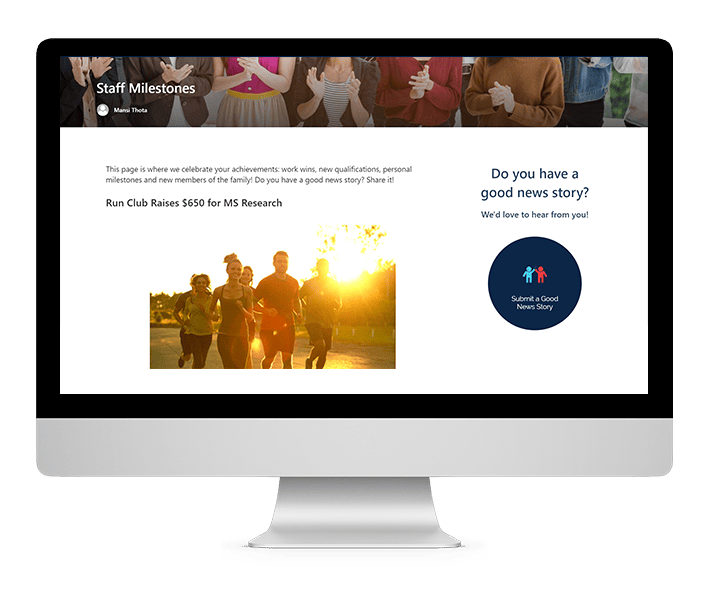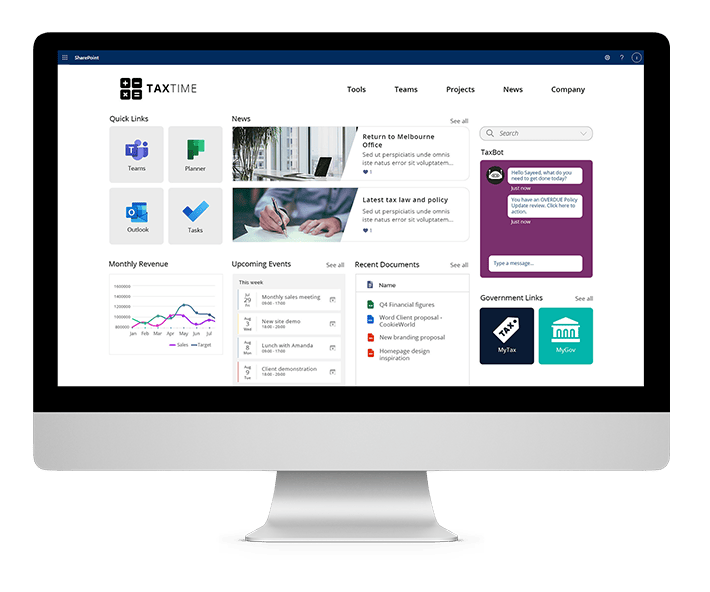With digital platforms increasingly taking the place of in-person interaction, intranet engagement is crucial to organisational culture as well as employee satisfaction and productivity. Intranet owners must create an interesting, welcoming space to converse, learn and engage..
“It’s never been more important for employers to meet employees where they are with personalised information so they feel informed, supported and connected.”
Nicole Alvino,
Co-founder, SocialChorus
KNOW YOUR AUDIENCE
Have a clear understanding of your users.
- What does the average user look like?
- Which topics have they historically engaged with?
- How do they prefer to consume content – headline summaries, long form articles, visual processes, chat threads, live data feeds?
- How will they be accessing it – PC, tablet, mobile?
This information can come from employee data, usage reporting, interviews or surveys, Consider developing user personas to guide content planning. Persona criteria might include role, department or location and at least some of your content should be targeted according to persona.
COMPELLING INTRANET CONTENT
Priority content should grab the attention of the user. Elements to consider include:
We spend most of our lives at work. Employee experience is critical for happiness and overall wellbeing.
According to a Gartner survey, only 13% of employees are fully satisfied with their experience at work.
1. Headings
2. Images
Imagery is incredibly powerful. It captures a user’s attention and directs their focus. It’s generally obvious when an author has put thought into featured images and who has picked the first stock offering. Maximise the impact of intranet images by:
Quality resolution, no pixelation
Correct sizing and proportion
Complying with brand guidelines
3. Actionable content
Does your intranet content encourage interaction and response? This is at the core of intranet engagement. Try these tips to stimulate action.
As well as sharing positive company results, try asking people to:
- Share their biggest success from the quarter
- Tag a colleague and acknowledge their contribution
- Post a picture of their team celebrating
There are many ways to weave an interesting call to action into your content. Compelling content invites employees to get involved.
4. Highlight the call to action
How content is presented will impact the level of response achieved. When you post an enticing headline and image from a news article, include a call-to-action button inviting employees to ‘comment now’ or ‘share your feedback’. This gives employees the opportunity to get involved, and they’ll be more likely to provide a response.

KNOW YOUR AUDIENCE
Have a clear understanding of your users.
- What does the average user look like?
- Which topics have they historically engaged with?
- How do they prefer to consume content – headline summaries, long form articles, visual processes, chat threads, live data feeds?
- How will they be accessing it – PC, tablet, mobile?
This information can come from employee data, usage reporting, interviews or surveys, Consider developing user personas to guide content planning. Persona criteria might include role, department or location and at least some of your content should be targeted according to persona.

Test and Learn
Intranet reporting is vital to understanding the level of engagement and assess the results of any improvements. Key metrics include:
- Active Intranet Users and Usage Time
- Reach – ie intranet users / total employees, including frontline staff
- Clicks, Comments and Shares
- Volume of User-Generated Content
- Who are your top users?
- Most and least viewed items
If something isn’t working, make any necessary changes and then continue to monitor.
Need Help with Engaging Intranet Communication?
If you’re still struggling to get results, WebVine can help.
It may be time to upgrade to a more powerful intranet solution like Injio which offers strong personalisation and flexibility to drive adoption and engagement.
